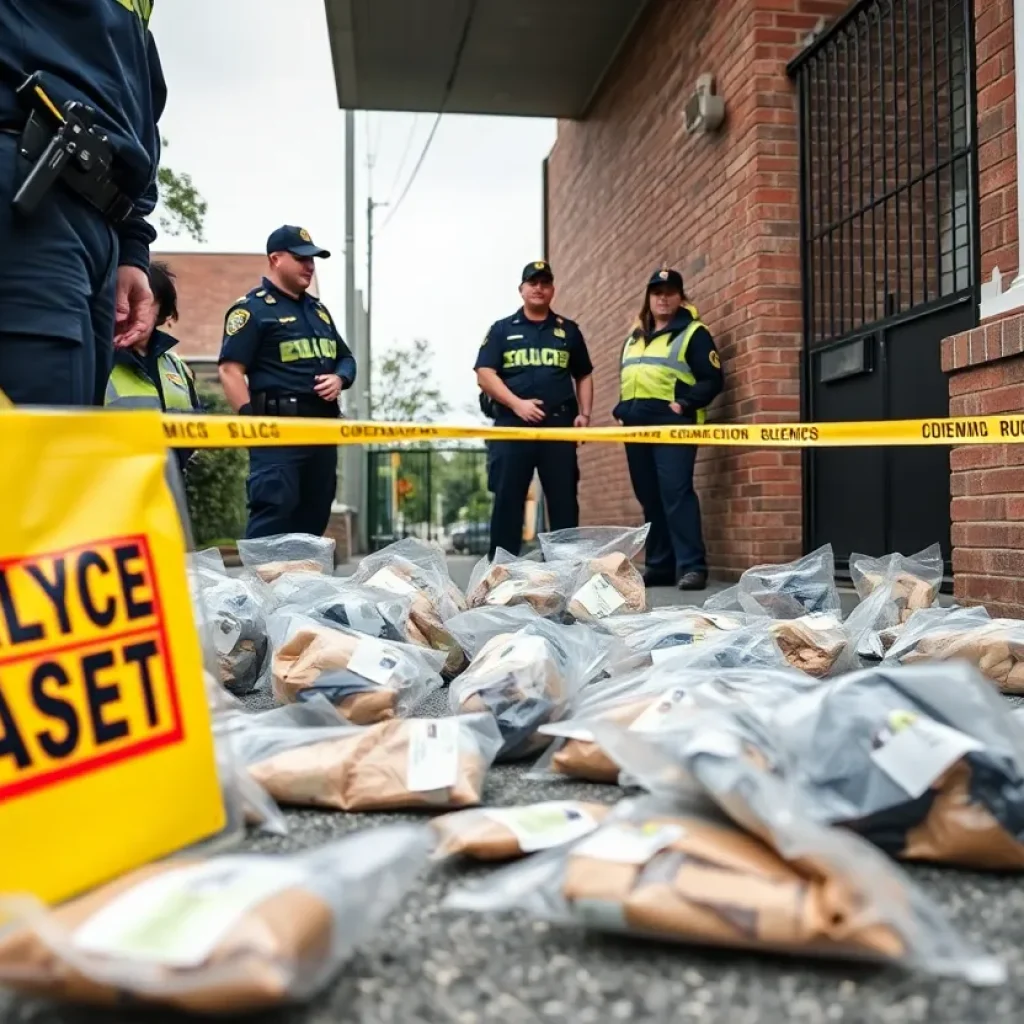Greenwood, SC News
TOP Green wood STORIES
BREAKING NEWS
Fire Destroys Garage in Greenwood County
News Summary A garage in Greenwood County was completely destroyed by an accidental fire on December 27, 2024. Firefighters responded quickly and no injuries were reported, but the incident highlights...
Major Drug Bust Shakes Greenwood: Over 30 Pounds of Illegal Substances Seized
News Summary In a significant drug bust on January 14, Greenwood law enforcement seized over 30 pounds of illegal substances and arrested three individuals. This operation, conducted by the Greenwood...
Greenwood County Seizes Large Fentanyl Haul in Major Drug Bust
News Summary Greenwood County, South Carolina, has seen a significant drug bust following a six-month investigation. Law enforcement arrested Khalil Hikeem Abney for trafficking over 1,000 grams of fentanyl, following...
Vahjen Family Leads Greenwood Christian Soccer Teams
News Summary The Vahjen family has taken on the challenging roles of head coaches for the girls and boys soccer teams at Greenwood Christian. This husband-and-wife duo, Lauren and Brian,...
Kent Boles Wins Ware Shoals Council Election Despite Low Turnout
News Summary Kent Boles has secured his position as an at-large council member for Ware Shoals in a recent special election marked by low voter participation. With only 58 votes,...
Greenwood Firefighters Tackle Early Morning House Fire
News Summary On a crisp Saturday morning, Greenwood residents were awakened by sirens as firefighters battled a house fire that broke out around 5:11 a.m. at 223 East Ave. The...
Severe Thunderstorms Rattle the Tri-State Area
News Summary On Thursday morning, the Tri-State area faced severe thunderstorms that led to significant disruptions, particularly at JFK, LaGuardia, and Newark airports. Travelers experienced ground stops and ongoing delays...
Greenwood Woman Arrested Following Vehicle Break-In Incident
News Summary On March 14, 2025, Veronica Andrea Davis, a 39-year-old woman from Greenwood, was arrested after her involvement in a vehicle break-in that led to the theft of credit...
Heartbreaking Tragedy Strikes Waterloo Community
News Summary A tragic accident in Waterloo led to the death of an 84-year-old woman following a two-vehicle crash at the intersection of Cannon Road and Riverfork Road. The community...
BUSINESS
Greenwood County Council Approves Key Zoning Changes
News Summary The Greenwood County Council has passed significant zoning changes, including the approval of a long-term RV park aimed at accommodating traveling workers. This decision to rezone 413 acres...
A Tale of Transformation: Carly Barton’s Inspiring Journey
News Summary Carly Barton’s inspiring story showcases her remarkable transformation from a high school dropout to a successful medical assistant in Clearwater, South Carolina. With the support of SC Works,...
Local Woman Transforms Life Through SC Works
News Summary Carly Barton, a Clearwater resident, has turned her life around with the help of the SC Works program, becoming a full-time medical assistant. After earning her GED and...
New Health Sciences Building Breaks Ground at Piedmont Technical College
News Summary Piedmont Technical College has officially begun construction on a new health sciences building that aims to address the healthcare workforce shortage. Set to cost $16.1 million, the facility...
New Ownership Announced for Main and Maxwell Gallery
News Summary Main and Maxwell Gallery in Greenwood is set to undergo a significant change as Kristen Bennett steps in as the new owner after Laura Bachinski’s retirement. Established in...
Historic Opening of HayGood Manor in Abbeville
News Summary Abbeville welcomes HayGood Manor, the first bed and breakfast established by an African American woman in a historic residence. Selina Goodwin-Hay combines her culinary expertise and passion for...
Charles & Associates Appoints New Service Manager
News Summary Charles & Associates has welcomed Jonathan Griffin as the new service manager, bringing local insight and expertise to home repair and remodeling in Greenwood. Griffin’s community ties and...
Huey Magoo’s Opens in Greenwood, SC
News Summary Huey Magoo’s has officially opened its doors in Greenwood, SC, marking its 70th restaurant. With a spacious layout, outdoor patio, and a wide variety of chicken dishes, it’s...
Growth in Lander University’s Sport Management Program
News Summary Lander University’s Sport Management Program has experienced significant growth over the last three years, with enrollment increasing over threefold. The program offers rigorous academic coursework enhanced by hands-on...
Events/What's Happening
Arts and Theater Events in Greenwood This Month
News Summary Greenwood is buzzing with arts and theater events this month as spring brings a variety of shows and exhibits. Don’t miss ‘Golden Girls: The Laughs Continue,’ the MAT...
Freddie McClendon Honors His Father on American Idol
News Summary Freddie McClendon, a 19-year-old from Greenwood, SC, delivered an emotional audition on American Idol, performing a heartfelt tribute to his late father. His original song, ‘You Never Loved...
Ninety Six Town Council Termination of Clerk-Treasurer
News Summary The Ninety Six Town Council announced the termination of Clerk-Treasurer Ketekash Crump-Lukie after six years of service. This decision follows a closed-door meeting addressing ongoing financial concerns, including...
Ben Bagwell Receives McElrath Scholarship at Lander University
News Summary Ben Bagwell, a junior vocal performance major at Lander University, has been awarded the prestigious McElrath Scholarship. This scholarship supports music majors in advancing their talents. Additionally, the...
Achievements and Celebrations in Ware Shoals District 51
News Summary Ware Shoals District 51 recently honored its outstanding students and dedicated staff during a lively ceremony. Highlights included Johana Bustos receiving notable scholarships, recognition for food service managers,...
Greenwood County Deer Supper Celebrates 37th Year
News Summary The Greenwood County Sheriff’s Office recently hosted its 37th annual deer supper at Greenwood Farmers Market, fostering community spirit. Families enjoyed a hearty meal prepared from 35 deer...
Greenwood School District Maintains Choice and Magnet Programs
News Summary Greenwood School District 50 has decided to keep its existing choice and magnet programs intact for the upcoming 2025-2026 school year. Following community feedback, the district will not...
Lander University Prepares High School Students for Job Market
News Summary Lander University’s inaugural Workforce Development Day offered nearly 300 high school students essential job skills. Students participated in hands-on activities, including a fashion show, resume building, and mock...
Community Lecture on Aging in Amish Culture
News Summary Join us in Greenwood for a profound community lecture titled ‘The Amish Way of Aging: The Dawdyhaus and the Grace of Life’ on April 1, 2025, at the...
CRIME
Major Drug Bust Shakes Greenwood: Over 30 Pounds of Illegal Substances Seized
News Summary In a significant drug bust on January 14, Greenwood law enforcement seized over 30 pounds of illegal substances and arrested three individuals. This operation, conducted by the Greenwood...
Greenwood County Seizes Large Fentanyl Haul in Major Drug Bust
News Summary Greenwood County, South Carolina, has seen a significant drug bust following a six-month investigation. Law enforcement arrested Khalil Hikeem Abney for trafficking over 1,000 grams of fentanyl, following...
Greenwood Woman Arrested Following Vehicle Break-In Incident
News Summary On March 14, 2025, Veronica Andrea Davis, a 39-year-old woman from Greenwood, was arrested after her involvement in a vehicle break-in that led to the theft of credit...
Heartbreaking Tragedy Strikes Waterloo Community
News Summary A tragic accident in Waterloo led to the death of an 84-year-old woman following a two-vehicle crash at the intersection of Cannon Road and Riverfork Road. The community...
Teen Arrested on Multiple Charges Following Traffic Stop Incident in Greenwood
News Summary In Greenwood, a 19-year-old named Teccarez Naraai Drummond was arrested during a routine traffic stop. Police found marijuana and a loaded firearm registered to another jurisdiction, leading to...
Tragic Death of Local Teen Rocks Greenwood, South Carolina
News Summary The community of Greenwood, South Carolina, is in mourning after the tragic death of 18-year-old Tanner Lee Price. His body was discovered at a residence, leaving friends and...
Greenwood County Authorities Investigate Shocking Fatal Shooting
News Summary Greenwood is in shock after a fatal shooting incident on Freeway Road. Authorities are investigating the case, but details about the victim remain undisclosed. The usually peaceful community...
Tragedy Strikes in Greenwood: A Life Cut Short
News Summary A shocking incident occurred in Greenwood County, South Carolina, where a young man was arrested for the murder of 24-year-old Johnny Frank Covington III. Covington was found dead...
Tragic Morning Collision Claims Lives of Two Spartanburg Women
News Summary A heartbreaking car crash in Spartanburg on Thursday morning claimed the lives of two women, Tonya Leakia Giles and Brittany Nicole Wooten. The accident involved a collision between...
POLITICS
Vahjen Family Leads Greenwood Christian Soccer Teams
News Summary The Vahjen family has taken on the challenging roles of head coaches for the girls and boys soccer teams at Greenwood Christian. This husband-and-wife duo, Lauren and Brian,...
Kent Boles Wins Ware Shoals Council Election Despite Low Turnout
News Summary Kent Boles has secured his position as an at-large council member for Ware Shoals in a recent special election marked by low voter participation. With only 58 votes,...
Severe Thunderstorms Rattle the Tri-State Area
News Summary On Thursday morning, the Tri-State area faced severe thunderstorms that led to significant disruptions, particularly at JFK, LaGuardia, and Newark airports. Travelers experienced ground stops and ongoing delays...
Greenwood City Council Advances Community Initiatives
News Summary The Greenwood City Council convened on Monday to discuss important community improvements including honoring local heroes, welcoming new city employees, and launching an educational initiative for waste collection....
Blake Bishop Appointed as District Three Director for PSTA
News Summary Blake Bishop, a dedicated social studies teacher at Ware Shoals High School, has been appointed as the District Three Director for the Palmetto State Teachers Association. His new...
Chloe Cox: A Healthcare Hero’s Inspiring Path
News Summary Chloe Cox from Greenwood, SC, transformed her personal challenge of her grandmother’s early-onset Alzheimer’s into a passionate pursuit of a healthcare career. Starting with health science classes in...
Greenwood, SC Sees Surge in Violent Incidents, Multiple Arrests Made
News Summary Recent weeks have seen a troubling rise in violent incidents in Greenwood, South Carolina, leading to multiple arrests. Authorities are stepping up efforts to ensure community safety after...
Body Found Near Greenwood Mall: Investigation Underway
News Summary Authorities in Greenwood are investigating the discovery of a male body found in the woods near Greenwood Mall. The police quickly responded after a report was received, leading...
Greenwood Authorities Intensify Fight Against Fentanyl Trafficking
News Summary In Greenwood, local authorities have intensified their efforts to combat fentanyl trafficking with a series of significant arrests and drug seizures. The operations have led to numerous apprehensions...
SPORTS
Augusta Jaguars Secure Thrilling Win Over Lander, 76-73
News Summary In an exhilarating game at Christenberry Fieldhouse, the Augusta men’s basketball team edged out Lander University with a close score of 76-73. The contest, filled with lead changes...
Greenwood County Recreation Complex Unveils Renovation
News Summary The Greenwood County Recreation Complex in South Carolina has undergone a $13 million renovation, transforming it into a vibrant hub for families and athletes. The renovated facility features...
Philadelphia Sparks Debate Over NL MVP Honors Amid Castellanos’ Support for Iglesias
Philadelphia Sparks Debate Over NL MVP Honors In the bustling atmosphere of Philadelphia, the baseball chatter has been buzzing around a bold statement made by Nick Castellanos, outfielder for the...
Sacramento Kings Ignite Fan Excitement with Thrilling Win Streak
Sacramento Kings Fans Getting Fired Up Over Recent Win Streak Hey there, basketball enthusiasts! If you’ve been keeping an eye on the Sacramento Kings, you might have noticed something pretty...
Philadelphia Eagles Secure Wild Card Victory Amid Controversial Saquon Barkley Decision
Philadelphia Eagles vs. New York Giants: A Wild Card Game to Remember This past Sunday in Philadelphia, the excitement surrounding the NFL Wild Card game was palpable. Fans packed the...
Rookie QB Jayden Daniels Leads Commanders to Thrilling Playoff Victory Over Buccaneers
Tampa Bay, Florida – A Rookie Sensation Shocks the NFL Well, folks, you just never know what to expect in the wild world of the NFL, and Sunday night gave...
Cleveland Browns Face Financial Dilemma as Deshaun Watson’s Injury Raises Contract Controversy
Cleveland: A Rollercoaster of Contracts and Injuries In the bustling city of Cleveland, the atmosphere around the Browns is electric, though not always in the right way. Just when fans...
Washington D.C. Prepares for Alex Ovechkin’s Historic Pursuit of Wayne Gretzky’s Goal Record
Washington D.C. Gears Up for a Historic Goal-Scoring Showdown Hey, hockey fans! Big news buzzin’ around the NHL as we’re witnessing something *truly spectacular* on the ice. Washington Capitals superstar...
Heartfelt Farewell to Bill McCartney: A Coaching Legend Remembered
Heartfelt Farewell to Bill McCartney: A Coaching Legend In Boulder, Colorado, the sports community is uniting in grief after the passing of Coach Bill McCartney, a monumental figure in college...



















































